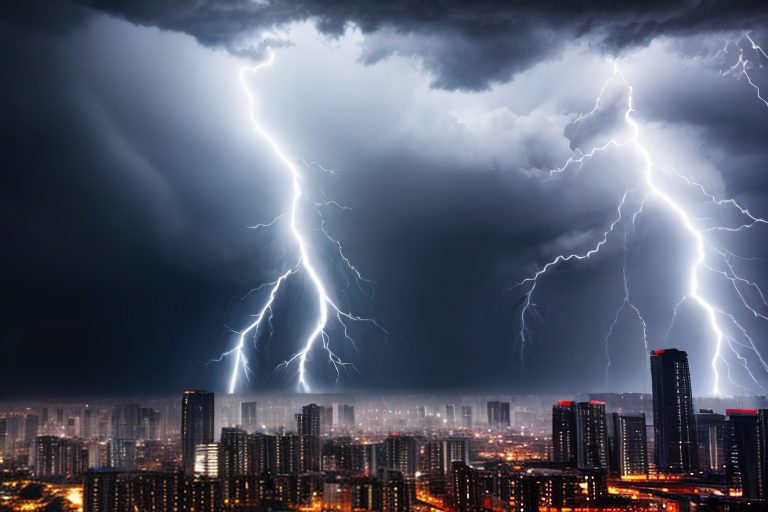
Protecting Yourself and Loved one’s from Nuclear Fallout: Essential Safety Tips
When it comes to nuclear fallout preparedness, ensuring the safety of you and your loved one’s is of utmost importance. One effective way to protect yourself is by stockpiling essential supplies.
These should include non-perishable food, water, and medication to sustain you for several days, as well as a battery-powered radio and extra batteries to stay informed.
In addition, establishing a communication plan with your family is crucial.
Cell phone networks and internet services may be disrupted during a nuclear emergency, so having a designated meeting point and a backup communication method, like two-way radios or a designated contact person, can ensure everyone’s safety.
Lastly, educating yourself and your family about nuclear safety is paramount.
By following these safety tips, you can better prepare for and navigate any potential nuclear fallout situation. Stay safe and be prepared.
Click here to learn more Survival Tips from Pro Outdoor Survival
How to Protect Against Nuclear Fallout
In the face of potential nuclear fallout, it is crucial to prioritize radiation protection and take necessary precautions to safeguard yourself and your loved one’s. With the threat of radioactive materials and the dangers they pose, it is paramount to be well-informed and prepared.
This includes understanding the importance of radiation monitoring and detection, as well as the need for a secure shelter with proper supplies.
By taking these practical steps, you can minimize the risks associated with nuclear emergency situations and ensure your wellbeing.
Stay informed, stay prepared, and prioritize your nuclear safety today.

Importance of Fallout Shelters for Safety
Fallout shelters are a crucial part of nuclear fallout preparedness, providing a safe haven against the harmful effects of nuclear radiation. These shelters are specifically designed to protect individual’s from the dangers of radioactive waste, offering a secure refuge during nuclear emergencies.
Exposure to radiation can have severe health consequences, such as radiation sickness and cancer, underscoring the significance of having a nuclear safety shelter for survival.
By seeking shelter in these structures, individual’s can effectively minimize their exposure to nuclear radiation and improve their long-term well-being.
At our company, we understand the importance of these shelters and strive to ensure the safety of our customers in times of nuclear disasters.
Facts About Fallout Shelters
- Fallout shelters provide a safe haven against the harmful effects of nuclear radiation.
- These shelters are designed to protect individual’s from the dangers of radioactive waste.
- Exposure to radiation can lead to severe health consequences, including radiation sickness and cancer.
- Seeking shelter in nuclear safety shelters can effectively minimize exposure to nuclear radiation and improve long-term well-being.
Emergency Preparedness for Nuclear Disasters
In the face of a nuclear disaster, being prepared is crucial. Emergency readiness for nuclear disasters involves taking proactive steps to ensure the safety and well-being of individual’s and communities.
While it is impossible to predict when or where a nuclear disaster may occur, being equipped with knowledge and resources can make a significant difference in mitigating the impact.
One key aspect of emergency preparedness for nuclear disasters is understanding the potential risks and hazards associated with radiation.
This includes knowing how to identify and respond to radiation exposure, as well as understanding the long-term effects of radiation on human health. Knowing how to properly evacuate or shelter in place during a nuclear emergency is essential.
Another important consideration is having the necessary supplies and resources on hand to sustain oneself during an emergency. This includes having a well-stocked emergency kit that includes essentials such as food, water, medications, and communication devices.
Understanding the Dangers of Radiation
Understanding the Dangers of Radiation and Minimizing Exposure
In today’s world, it is crucial for businesses and individual’s to be aware of the dangers of radiation and take the necessary precautions to minimize exposure. Whether its a nuclear accident or detonation, the potential consequences can be devastating.
It is essential to educate ourselves on the immediate and long-term effects of such events and take appropriate measures to protect ourselves and our loved one’s.
To do so, we must first understand the causes of nuclear accidents and how nuclear power plants are regulated and monitored.
It is important to be aware of the measures in place to prevent radiation leaks. By prioritizing radiation protection, we can safeguard not only human health but also the environment.
So, let’s come together, stay informed, and take the necessary steps to reduce the risks associated with radiation exposure. let’s protect ourselves and our future generations, for a safer world.
| Causes of Nuclear Accidents | Regulation and Monitoring of Nuclear Power Plants | Measures to Prevent Radiation Leaks |
|---|---|---|
| Human error, equipment failure, natural disasters | Government agencies, international organizations | Stringent safety protocols, regular inspections |
Minimizing Radioactive Contamination at Home
Important for ensuring nuclear safety. Regularly checking for updates on tap water and food supplies can help you stay informed about any potential radiation risks in your area.
Creating a designated decontamination area near the entrance of your home, equipped with necessary supplies, can minimize the spread of radioactive materials inside.
Proper ventilation, including regular cleaning and maintenance of ventilation systems, helps remove potential contaminants and reduce the buildup of radioactive particles indoors.
Storing food and water in sealed containers adds an extra layer of protection against contamination.
Recognizing Symptoms of Radiation Sickness
Recognizing the symptoms of radiation sickness is crucial for individual’s and businesses to identify potential health risks following a nuclear event. It is important to understand that the severity of symptoms can vary depending on factors such as exposure level, duration, age, overall health, and type of radiation exposure.
These symptoms may not be immediately apparent and can manifest days or even weeks after exposure.
Common symptoms of radiation sickness include nausea, vomiting, diarrhea, loss of appetite, fatigue, weakness, dizziness, confusion, hair loss, skin burns, and open sores.
It is important to seek medical attention for accurate diagnosis, as these symptoms can be similar to those of other illnesses.
By recognizing these symptoms, individual’s and businesses can prioritize their safety and well-being in the face of radioactive exposure.
| Symptom | Severity | Onset |
|---|---|---|
| Nausea | Mild to Severe | Days to Weeks |
| Vomiting | Mild to Severe | Days to Weeks |
| Diarrhea | Mild to Severe | Days to Weeks |
| Loss of Appetite | Mild to Severe | Days to Weeks |
| Fatigue | Mild to Severe | Days to Weeks |
| Weakness | Mild to Severe | Days to Weeks |
| Dizziness | Mild to Severe | Days to Weeks |
| Confusion | Mild to Severe | Days to Weeks |
| Hair Loss | Mild to Severe | Days to Weeks |
| Skin Burns | Mild to Severe | Days to Weeks |
| Open Sores | Mild to Severe | Days to Weeks |
Role of Nuclear Power Plants in Safety
Agent = Article Editor} {Task = Update the sentence and make sure no more than one of the keywords: nuclear fallout preparedness, nuclear safety, radiation protection is used in this article: Nuclear power plants play a vital role in ensuring safety and security in the production of electricity. The use of advanced technology and engineering is one important aspect of nuclear power plant safety.
These plants are equipped with sophisticated systems that constantly monitor and control the nuclear reactions to ensure stability and prevent any potential risks.
The containment structures surrounding the reactor cores are designed to withstand extreme conditions, such as earthquakes and severe weather events, to prevent the release of radioactive materials.
Alongside advanced technology, the rigorous training and expertise of personnel involved in operating and maintaining these plants ensure that they are well-prepared to handle any emergency situations. Regular drills and simulations are conducted to test response capabilities in relation to radiation exposure prevention and radiation safety precautions.
Monitoring Radiation Levels for Preparedness
Regular monitoring of radiation levels is crucial for the safety and well-being of individual’s in the event of a nuclear incident. To effectively monitor radiation, authorities, emergency response teams, government agencies, and nuclear power plant operators rely on radiation detectors such as Geiger-Muller counters and scintillation detectors.
These devices accurately measure the amount of radiation present in the environment, helping identify potential risks.
In addition, it is essential to establish a long-term monitoring system by regularly testing air, water, soil, and food samples to ensure radiation levels remain within acceptable limits.
Effective communication with the public, including timely updates, explanations of risks, and precautionary advice, is vital for promoting preparedness. By implementing these measures, we can guarantee individual safety and prevent any adverse effects caused by radiation exposure.
Radiation Monitoring
- Radiation detectors like Geiger-Muller counters and scintillation detectors are used by authorities, emergency response teams, government agencies, and nuclear power plant operators to accurately measure radiation levels.
- Regular testing of air, water, soil, and food samples is essential to establish a long-term monitoring system and ensure radiation levels remain within acceptable limits.
- Effective communication with the public, including timely updates, explanations of risks, and precautionary advice, is vital for promoting preparedness in the event of a nuclear incident.
- By implementing these measures, individual safety can be guaranteed and adverse effects caused by radiation exposure can be prevented.
Pandemic Preparedness Biohazard Suits Medical PPE
Surviving Extreme Weather Essential Tips






















